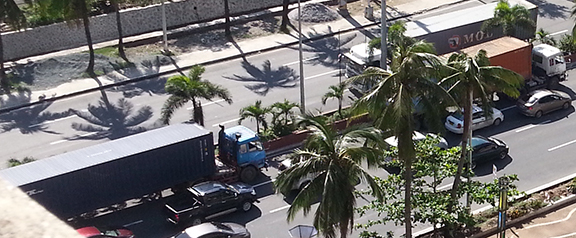 Manila’s international port operators are set to launch in early September a truck booking system for Manila ports designed to help lick the persistent problem of road congestion.
Manila’s international port operators are set to launch in early September a truck booking system for Manila ports designed to help lick the persistent problem of road congestion.
The Terminal Appointment Booking System (TABS) is scheduled to go live on September 1, according to International Container Terminal Services, Inc. (ICTSI) and Asian Terminals Inc., respective operators of Manila International Container Terminal and Manila South Harbor.
In a presentation to customs brokers on July 28, South Harbor marketing manager Reginald Rivera said a team composed of personnel from both operators is now disseminating information on the system; more detailed sessions will be held with stakeholders on August 6.
Toward the second week of August, ATI and ICTSI will train their respective clients, and a pre-transition phase is eyed from August 24-31 before TABS is activated, Rivera said.
TABS is a web-based system in which customs brokers, importers, exporters, and cargo owners select the time slots for the delivery and withdrawal of their cargoes. Rivera noted the system is similar to an airline booking system under which one cannot fly without an appointment.
He said TABS will solve the pernicious problem of road congestion in Manila since truck deliveries and pullouts will be spread throughout the day to reduce queues and peaks, and minimize the number of trucks on the road.
“Truck arrives as scheduled and can be assured (of prompt service),” Rivera added.
Last May, the Manila port operators tapped Australian IT company 1-Stop to establish a container booking system, which is now officially called TABS.
ICTSI industry relations specialist Voltaire Wycoco, during the July 28 forum, noted the project has been approved by government.
Manila port operators have been suggesting the creation of a vehicle booking or truck appointment system even before the Manila City government implemented the truck ban in February last year that triggered massive congestion at Manila ports.
Benefits of the booking system, according to Rivera, include enabling planning for appropriate resources since volume and schedule are predictable; reduced queuing because yard resources are sufficient to serve all trucks; manageable and consistent flow of trucks, doing away with the need for truck bans; arming clients with information on their containers; and access to the application through mobile devices.
Under the system, clients can pick a time slot as to when their trucks will pick up or deliver containers. The system will be able to tell if the container has been cleared and is ready to be withdrawn.
In addition, the system does not limit trucks to proceed to the port only during the booked hour, but allows them to arrive within a certain timeframe. For example, if an importer chooses 10 a.m. to 11 a.m. as its slot, the system will still allow the truck to come an hour earlier or even five hours later as long as this schedule is established and agreed upon by the terminal operators.
The system books the container number to give stakeholders the flexibility to choose or replace their trucks. It also allows booking of empties, double transactions, and appointments to designated examination areas. More details will be provided by the operators during the coming sessions in August.
The operators assured that help desks or customer service staff will be provided to assist stakeholders in using the system.
Rivera admitted there will be birth pains at the onset but that in the long term the system is the “best solution to whatever congestion that may happen once again.” – Roumina Pablo





